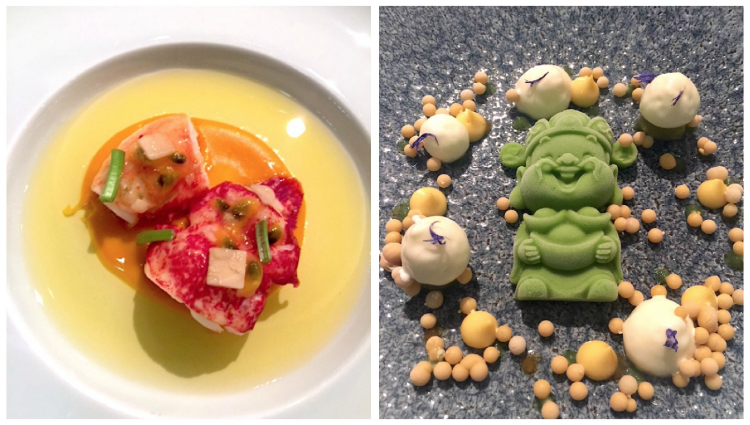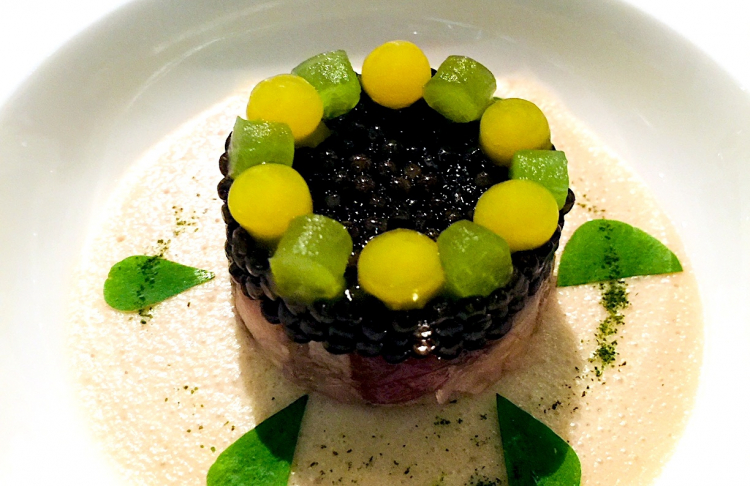Milan-Beijing? Stop in Berlin. Well, yes, it is funny: you get ready for the weekend, book your flight and hotel, check the temperature (minus 3 at night, plus 5 during daytime), take the train to Malpensa, the flight to Berlin Tegel, a taxi to the hotel and then one to Mitte... So far, so good. Berlin, the capital of the new German empire, Merkel-stadt, the city of Chancellor Angela, as well as cultural, artistic, political capital of united Germany welcomes us warmly, from Potsdamer Platz to Pergamonmuseum. And then right after the Brandenburg Gate, after hotel Hotel Adlon, Unter Den Linden, the most famous alley, begins.
Nearby, at 26 Rudi-Dutschke-Straße, there’s the entrance to the restaurant of Berlin’s most prominent chef of the moment, and perhaps Germany’s too:
Tim Raue.
His story is a nice one: a failed architect, since he couldn’t pay his studies Raue decided to express his creativity in the kitchen. He first worked in hotel brigades, then finally opened his own restaurant in 2010. Today, on top of the restaurant named after him, Tim Raue, he runs La Soupe Populaire, which serves (hear, hear!) popular German cuisine, and Sra Bua, at Hotel Adlon, offering Asian cuisine.
Now:
Raue could have become the paladin of German cuisine, what with Wiener Schnitzel and Bratwurst, and game, goose, pork and meat cooked with plums and different fruits, and most of all tons of potatoes, beetroot, carrots and any other tuber available in the icy soil of the German Republic. Instead...
...instead after entering the restaurant we arrive into a courtyard. The two stone lions right outside the doors remind us of the entrance to the temples of another Republic: the Popular Republic of China. Indeed
Raue presents a cuisine for which speaking of Chinese influence is reductive. Marinades, compositions, sauces and cooking procedures come from the Millennial Mandarin tradition, from recipes from Sichuan, from Beijing’s glazing. There are few concessions made to European gastronomic culture, and never to the German one.
So, the irony of it all, while one of the best German restaurants in the world,
Suhring, earns a well-deserved Michelin star in Thailand, -
nemo propheta in patria -
Tim Raue in Berlin charms with
Lobster, carrot and coriander or
Chicken satay with mango and peanuts, or
Dim Sum with black truffle. Of course all these dishes are made gentler, with new takes and different decorations, but there’s clearly an oriental influence.

Two dishes from Tim Raue: Lobster, carrot and coriander and the dessert, Passion fruit, Tonka beans and cucumber
There’s only a few, purely creative dishes: the marvellous imperial caviar with cucumber marinated in rice vinegar, yuzu gelatine, tartare of marinated mackerel, wasabi and so on. And the incredible hare "
à la royale, Sichuan version", once again prominently featuring China.

Imperial caviar with cucumber marinated in rice vinegar, yuzu gelatine, tartare of marinated mackerel, wasabi
I smile, thinking that once, when chatting with
Niko Romito, I found out he and
Raue have cooked together in the past. I promise myself to ask the Italian chef
what they cooked, given they’re so distant in their way of building a dish: one being very ornate and multi-ethnic, the other essential, clean and deeply Italian (and Abruzzese). Two deeply different styles, joined by the same obsession and constant search for the perfect flavour.
We return to Italy with beautiful memories of an innovative and unexpected cuisine. Try it. It’s really worth it. Let Wiener Schnitzel wait!
Translated into English by Slawka G. Scarso